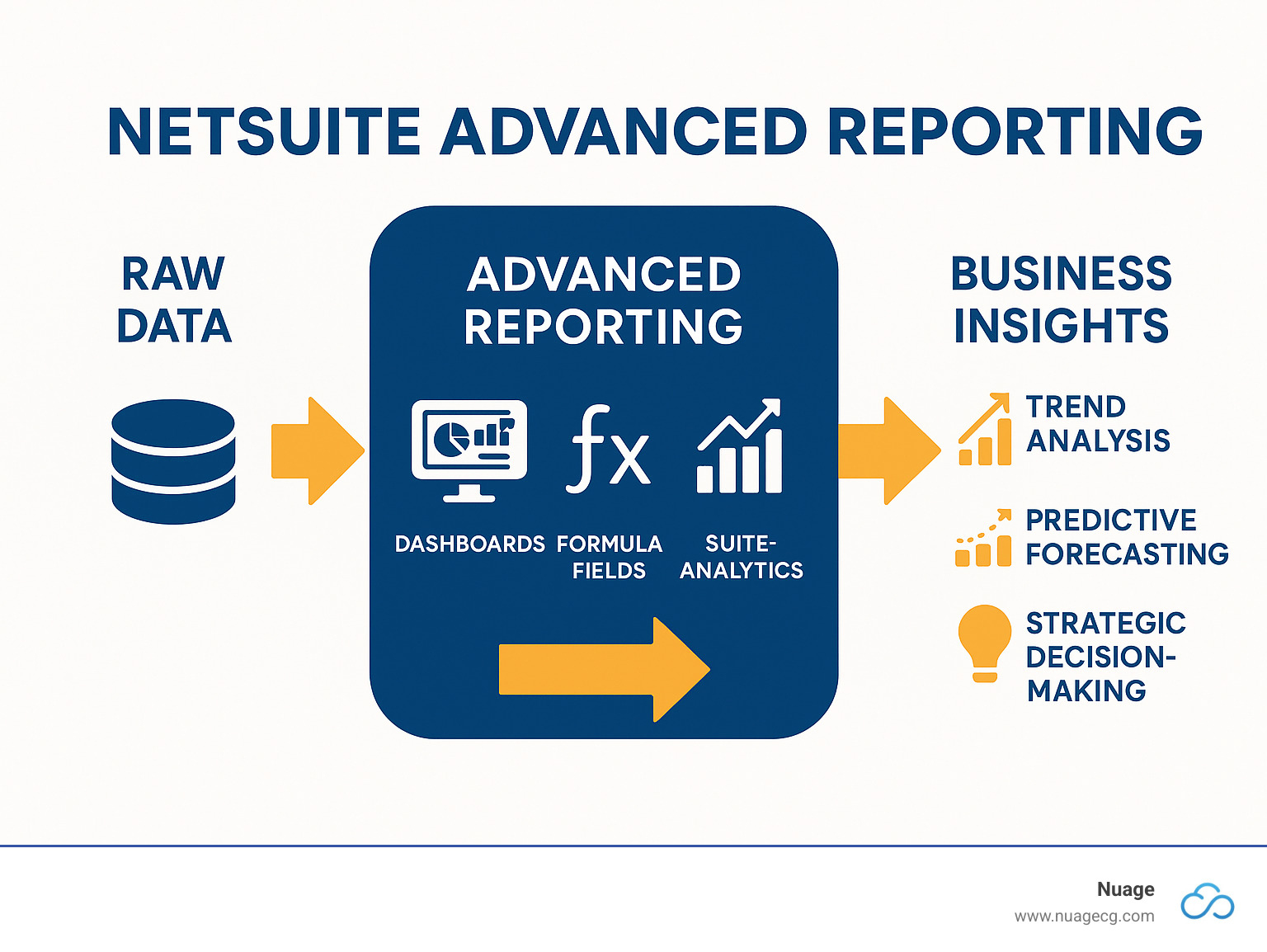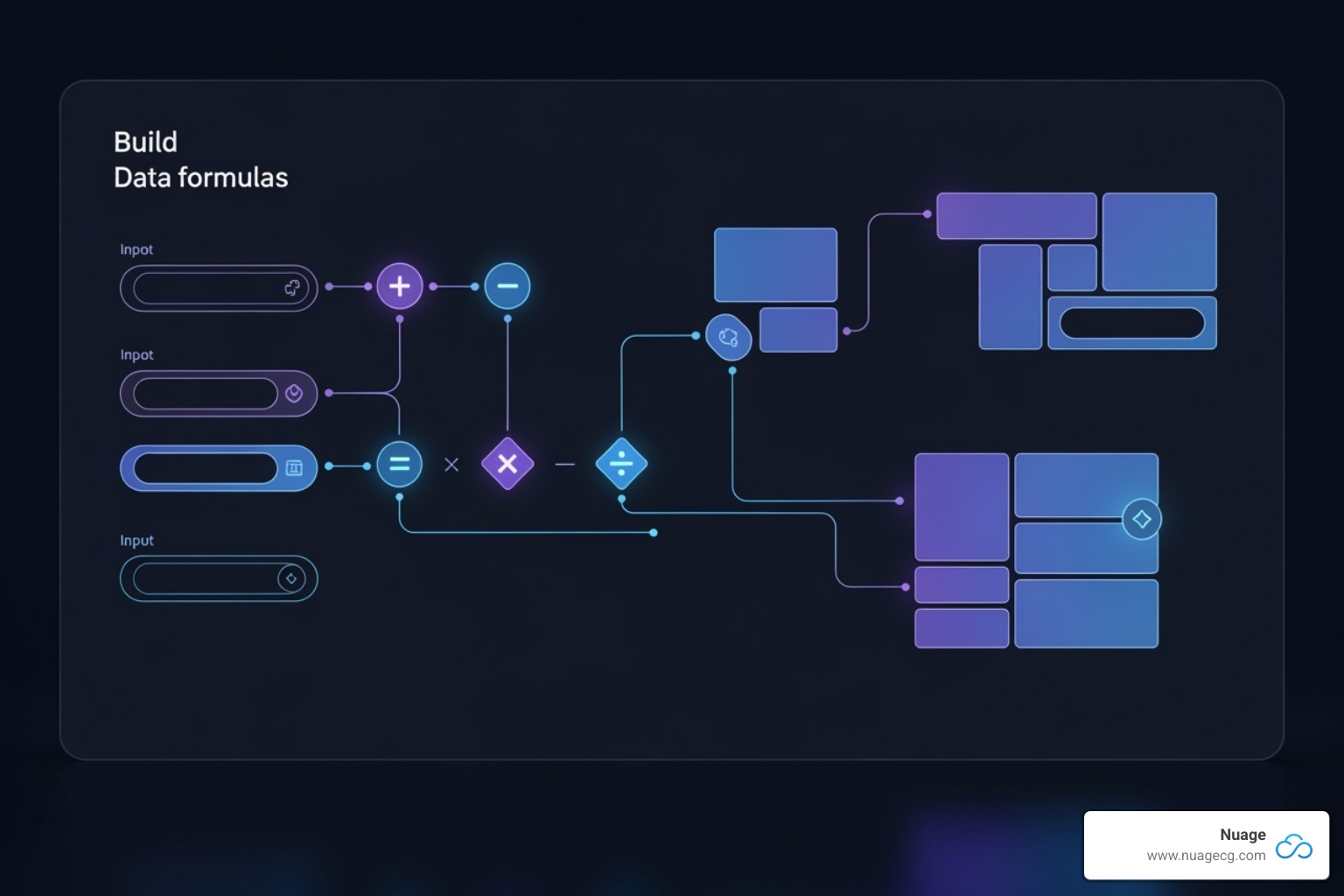From Standard Reports to Strategic Insights
NetSuite advanced reporting transforms basic data summaries into powerful business intelligence that drives strategic decisions. While standard reports show you what happened, advanced reporting reveals why it happened and what you should do next.
Key Components of NetSuite Advanced Reporting:
- Customizable Dashboards & KPIs – Real-time performance monitoring with role-based insights
- Advanced Financials Module – Budget management, expense allocations, and statistical accounts
- Formula Fields – Dynamic calculations and conditional logic for custom metrics
- SuiteAnalytics & Data Warehouse – AI-powered insights combining NetSuite and external data
- Saved Searches – Flexible, real-time queries with advanced filtering capabilities
The difference between basic and advanced reporting is like comparing a car’s speedometer to its full dashboard. Basic reports tell you how fast you’re going. Advanced reporting shows your fuel level, engine temperature, navigation route, and warns you before problems occur.
As one NetSuite expert puts it: “Imagine you’re driving a car really fast, and you have duct tape over your dashboard. You don’t know how fast you’re going, you don’t know how much gas you have, and you’re probably not going to get where you’re trying to go. NetSuite provides that dashboard for us.”
Why Advanced Reporting Matters:
Most businesses use only 20% of NetSuite’s reporting potential. They rely on standard reports that provide limited insights and require manual analysis. Advanced reporting eliminates this gap by offering:
- Real-time visibility into all business functions
- Automated calculations that reduce manual effort
- Predictive insights powered by AI and machine learning
- Customizable views custom to different roles and departments
I’m Louis Balla, CRO at Nuage, and I’ve spent over 15 years helping businesses open up the full potential of their ERP systems through strategic NetSuite advanced reporting implementations. My experience building and installing third-party applications has given me deep insight into the reporting challenges teams face and how to overcome them.

Basic netsuite advanced reporting terms:
The Core Components of NetSuite Advanced Reporting
Think of NetSuite advanced reporting as your business intelligence command center. It’s where raw data transforms into the insights that drive smart decisions. Let’s explore the three powerhouse components that make this change possible.
Visualizing Performance with Customizable Dashboards and KPIs
Picture walking into your office and instantly knowing exactly how your business is performing. That’s what NetSuite’s role-based dashboards deliver – a personalized view of your most critical metrics, updated in real-time.
Gone are the days of waiting weeks for reports that are already outdated. NetSuite’s dashboards put live data at your fingertips, whether you’re tracking sales performance, monitoring cash flow, or keeping an eye on inventory levels.
Key Performance Indicators (KPIs) are where the magic really happens. With over 75 pre-built KPIs, you can measure what matters most to your business. Set up color-coded alerts that grab your attention when your bank balance drops too low or when sales targets are at risk. These visual cues make it impossible to miss the signals that matter.
Report Snapshots take this a step further by embedding summarized report data directly into your dashboard. Instead of running full reports every time you need an update, you get instant access to the information that drives your decisions.
The beauty of self-service analytics means your team doesn’t need to wait for IT every time they need a custom view. Sales managers can track their team’s progress against quotas, while individual reps focus on their pipeline and conversion rates. Everyone gets exactly what they need, when they need it.
For more insights into how NetSuite can transform your operations, explore our comprehensive guide to NetSuite solutions.
Deep Financial Analysis with the Advanced Financials Module
Financial management isn’t just about keeping the books balanced – it’s about understanding the story your numbers tell. NetSuite’s Advanced Financials module turns complex financial processes into clear, actionable insights.
Budget management becomes surprisingly straightforward when you can track budget versus actuals in real-time. Import your budgets from Excel or use the ‘Copy Budgets’ feature to quickly create new projections based on historical data. No more scrambling at month-end to figure out where you stand financially.
Expense allocations solve one of accounting’s biggest headaches. Enter expenses first, then allocate them precisely using weighted formulas. Set up recurring allocation schedules that automatically distribute costs across departments, projects, or locations. This gives you the true cost picture you need for accurate pricing and profitability analysis.
Amortization schedules automate the process of spreading costs over time. Link these schedules to bills, projects, or other entities to ensure your expenses align with revenue recognition. Whether you’re amortizing prepaid costs or spreading project expenditures based on completion percentages, the system handles the complexity for you.
Here’s where statistical accounts become your secret weapon. Store non-monetary data like headcount, square footage, or equipment hours, then use these real-world drivers to allocate costs dynamically. This approach gives you far more accurate departmental and project cost analysis than traditional allocation methods.
Multi-book accounting capabilities ensure you can maintain different accounting standards simultaneously, whether for regulatory compliance or management reporting needs.
These features work together to create a comprehensive financial reporting ecosystem that goes far beyond basic accounting. For deeper technical details, NetSuite’s Advanced Financials documentation provides additional insights.
Expanding Your Data Universe: SuiteAnalytics, AI, and Data Warehouse
Your business doesn’t exist in a NetSuite vacuum. Critical data lives in other systems, spreadsheets, and external sources. SuiteAnalytics Workbook and the NetSuite Analytics Warehouse bridge these gaps, creating a unified view of your entire business landscape.
AI-powered insights transform how you interact with your data. Instead of hunting for patterns, the system identifies trends, anomalies, and opportunities automatically. Predictive analytics moves you from asking “what happened?” to “what’s likely to happen next?” This shift from reactive to proactive decision-making can be game-changing for strategic planning.
The NetSuite Analytics Warehouse serves as your central data hub, consolidating NetSuite data with information from other business applications. Imagine combining your ERP data with customer service metrics, marketing campaign results, and external market data – all in one place.
Combining non-NetSuite data opens up entirely new analytical possibilities. You might find correlations between marketing spend and sales performance that were invisible when data lived in separate systems. Trend identification becomes more accurate when you’re working with complete information rather than fragmented datasets.
This comprehensive approach to data analysis leverages Oracle Analytics Cloud and Oracle Autonomous Data Warehouse for enterprise-grade performance and AI/ML capabilities. The result is NetSuite advanced reporting that scales with your business and adapts to your evolving analytical needs.
The combination of customizable dashboards, advanced financial analysis, and expanded data integration creates a reporting ecosystem that grows with your business. Each component strengthens the others, delivering insights that drive better decisions across every aspect of your operations.
The Engine of Customization: Opening Power with Formula Fields
Formula fields are the cornerstone of customizing reports in NetSuite, allowing you to perform on-the-fly calculations, apply conditional logic, and display data exactly how you need it. This is where the magic of NetSuite advanced reporting truly shines.
What are Formula Fields and Why are They Essential for netsuite advanced reporting?
NetSuite’s saved search functionality is already a powerful tool, but formula fields lift it to an advanced reporting engine. Think of them as miniature spreadsheets embedded directly within your NetSuite searches and reports, allowing for incredibly flexible and dynamic data manipulation.

What are NetSuite formula fields and how do they contribute to advanced reporting?
Formula fields are dynamically calculated fields that can perform calculations, manipulate text or dates, and apply conditional logic on the fly. They are expressions that dynamically calculate values based on other fields, constants, or functions.
Why are they essential for NetSuite advanced reporting?
- Dynamic Calculations: They allow us to create custom metrics that aren’t natively stored in NetSuite. For instance, we can calculate profit margins, remaining credit, or year-over-year comparisons directly within a report or search result.
- Conditional Logic: We can apply “if-then-else” logic to display specific text, numbers, or even apply conditional formatting based on certain criteria. This is incredibly useful for highlighting exceptions or categorizing data.
- Advanced Filtering: Formula fields can be used not just in search results (as custom calculated columns) but also in search criteria/filters. This allows us to filter records by a computed condition that would be impossible with standard filters. For example, filtering for items with negative on-hand quantity or transactions that are overdue by a specific number of days.
- Avoiding Custom Fields: Often, a value we need for reporting is a simple calculation based on existing data. Instead of creating and maintaining a separate custom field that stores this calculated value, a formula field can compute it dynamically when the report is run, saving on customization overhead.
- Real-Time KPIs: They help us define and display specific KPIs that are crucial for our business operations, offering immediate insights without manual calculations.
- SQL-like Syntax: NetSuite formulas leverage SQL-like syntax, supporting a wide array of Oracle SQL functions. This means if you’re familiar with SQL or even complex spreadsheet functions, you’ll feel right at home. This allows for complex calculations, string manipulations, date arithmetic, and conditional logic.
NetSuite imposes a 1000-character limit on each formula expression, so complex logic might need to be broken down or optimized. For more detailed guidance, the NetSuite Help Center provides extensive information on Using Formulas in Saved Searches.
Types of Formula Fields Available in NetSuite
NetSuite supports several formula field types, each designed to return a specific data format. Choosing the correct type ensures proper validation, formatting, and usability of your calculated data.
Here’s a breakdown of the main types:
| Formula Type | Purpose | Use Case Example |
|---|---|---|
| Formula (Numeric) | Returns a numerical value without any specific formatting. Ideal for calculations, counts, or IDs. | CASE WHEN {status} = 'Shipped' THEN 1 ELSE 0 END to count shipped orders. |
| Formula (Currency) | Returns a number formatted as a currency value, respecting the currency settings of the transaction or entity. | {item.cost} * 1.2 to calculate a 20% markup on an item’s cost. |
| Formula (Percent) | Returns a number formatted as a percentage. The underlying value should be a decimal (e.g., 0.25 for 25%). | ({price} - {cost}) / {price} to calculate the gross profit margin percentage. |
| Formula (Date) | Returns a date value. Essential for date-based calculations and filtering. | {trandate} + 7 to calculate a follow-up date one week after the transaction date. |
| Formula (Text) | Returns a string of text. Used for concatenating fields, displaying conditional messages, or reformatting text. | CASE WHEN {daysoverdue} > 30 THEN 'High Risk' ELSE 'Low Risk' END to categorize overdue invoices. |
| Formula (HTML) | Returns a string of text that is rendered as HTML. Allows for custom formatting like colors, links, or bold text. | CASE WHEN {inventoryavailable} < {reorderpoint} THEN '<p style="color:red;">Reorder Now</p>' ELSE '<p style="color:green;">In Stock</p>' END to create visual stock level alerts. |
